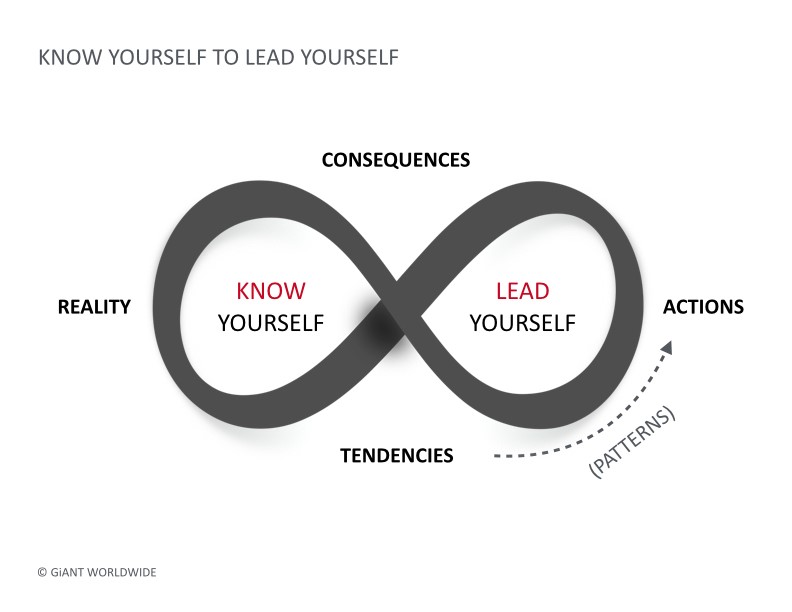This article is from Rick Shallenberger, a GCI-USA regional pastor and a contributing editor and feature writer for Equipper.
This is part 2 of a series on Christian leadership. For other articles in the series, click a number: 1, 3, 4, 5, 6, 7, 8.
Do you know what it’s like to be on the other side of you? That question, raised to the GCI-USA regional pastors in a training session with Tom Nebel (a GiANT Worldwide consultant), set me back on my heels. I’d never thought about it before. Tom said it’s like “having broccoli in your teeth—everyone knows it’s there, but they won’t tell you, so you have no idea.”

Tom’s point was that a lack of knowing yourself leads to being what he refers to as being unconsciously incompetent. In order to effectively lead yourself, you must first know yourself. Those who do (and act accordingly, with emotional intelligence), possess a vital competency when it comes to being able to lead others. This “know yourself to lead yourself” dynamic was illustrated by Tom using the diagram below.

As the diagram shows, the core of who we are as persons and leaders is a mix of our skill-sets, emotional intelligence, and innate wiring. As a leader, understanding this mix is like holding up a mirror and asking, “What is it really like to be on the other side of me?” Tom helped me grasp the importance of knowing myself in order to be more effective in leading myself and others. Allow me to provide an illustration.
Some of you may be surprised (said tongue-deeply-imbedded-in-cheek) to know that I have a tendency to talk too much, bringing the conversation back to me. If someone is telling a story, I’m thinking of a similar one that shows I may not only understand the experience, but have a better illustration from my own life (at least in my own mind!). This tendency (in the language of Tom’s diagram, above) creates an undesired pattern of focusing on the self and a subsequent action of interrupting or otherwise not listening effectively. The consequences do not lead to good relationships.
We all have certain tendencies that, being hardwired into our character and personalities, tend to create patterns of behavior. Those patterns can be good or bad, but over time become so ingrained that we simply are unaware of them (thus the importance of the proverbial mirror). These tendencies and resultant patterns of behavior not only impact our reactions, but also our decision-making processes. And our actions, as we are well-aware, have consequences, for good or for ill. These consequences then shape our reality.
So the reality of the environment in which we lead is heavily influenced by the tendencies we have as leaders. Again, What is it like to be on the other side of you? The more self-aware we become in answering this question, the more emotionally intelligent we become. This then leads to becoming even more self-aware, enabling us to make better choices concerning our actions. So rather than being defined by the ingrained repeating patterns of unhelpful habits, we choose to react differently.
Becoming aware of my tendency to talk too much, and to interject too many personal stories into conversations, made me more aware of the ones I’m involved in. More and more I’m choosing to remain silent because I don’t want that old pattern to be reinforced, or to define me. Because I want to hear what everyone else thinks, I choose at times to be quiet—to bite my tongue and simply listen to others.
As we grow in knowing ourselves and leading ourselves, we will find that our actions have consequences for good. Then the reality out of which we lead will become more healthy, enabling our influence as a leader to grow in the many opportunities we have to shape the church and the other leaders we have been called to love and to serve.



Great question to think about. I guess that helps us better recognize our “blind spots” (the broccoli in our teeth :). I looked at the resources in this Equipper, but I didn’t see anything that seemed to tell ways by which a leader can be alerted to his weak spots. Becoming self-aware is wonderful, but these dang blind spots are often very invisible to me. How can I ask others to help me see these glitches? Is there some separation between “leadership” and “personal” traits; in other words, if I ask for help to discern weak spots, how wide am I opening the door for feedback? What format(s) are proven to work most effectively and most comfortably for both the giver and receiver of feedback?
I have to second Lee’s concern. This is fine information — although it re-packages principles many of us are aware of — but is lacking any sort of measuring tool or recovery path. Would it work better to ask the Advisory Council for their honest feedback on my leadership or personality? Or take some sort of leadership assessment and then get others’ input on it? I’m a bit lost, and at the moment, more paranoid than usual about whether I’m letting too much of myself into my leadership. Can you recommend some additional helps?
One of the most difficult questions to ask is “What is it like being on the other side of me?” I would never suggest you start with a congregational survey, but I would suggest you start with someone you trust. Before that point, however, ask yourself if after presenting an idea or concept if you receive the desired response, action and consequence. If not, then it’s good to ask why? It’s usually not that the idea is bad, but it may be the way the idea is presented. Your first question is to ask if you are willing to hear that you have broccoli in your teeth? I would suggest the first step is asking God to let you hear what you might need to hear. Than Mark’s idea of asking your leadership team might be a good idea, but a better one might be to first ask some fellow pastors or leaders outside your congregation or ask your RP. Your RP has gone through the leadership training and can give you some insight. The purpose of this exercise it to become more self-aware. That means to be more aware of the responses you are receiving, the reactions to your ideas, the consequences you are facing. Once a piece of broccoli is pointed out to you, you will become more self-aware and more able to lead yourself and the cycle continues in a positive direction.